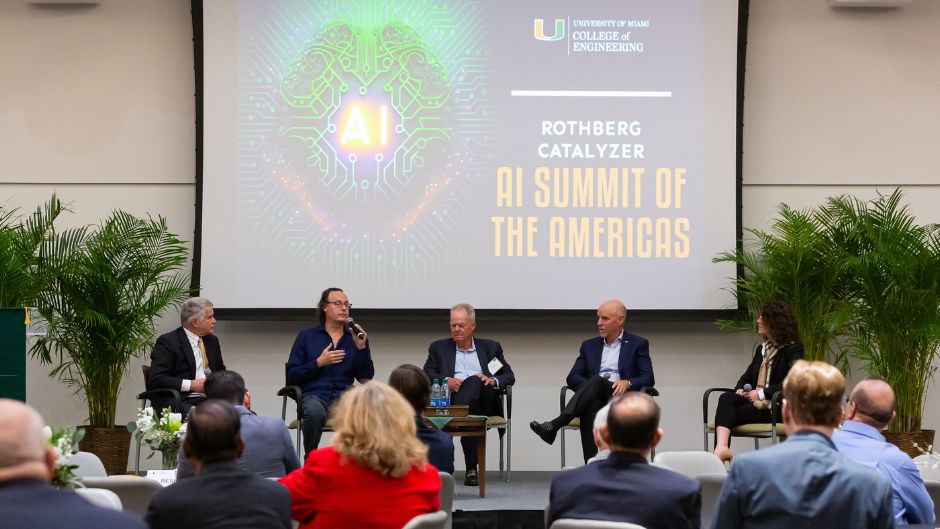The University of Miami provided a platform for conversation and the exchange of ideas at the Rothberg Catalyzer AI Summit of the Americas. The inaugural event, spearheaded by visionary biotech entrepreneur and philanthropist Jonathan Rothberg, brought together leaders from diverse industries to analyze the applications and implications of artificial intelligence.
In his opening remarks, Rothberg emphasized that Miami is strategically located to tap the talent of the Americas. He said the region also has tremendous untapped talent and “one of the most valuable things in the world other than capital is smart kids. There is so much brain power in the area and on this campus that needs to be leveraged to drive change.”
Pratim Biswas, dean of the College of Engineering, agreed, saying that the convergence of AI and engineering holds immense potential to revolutionize industries.
In the transportation industry, CEO of Ryder System, Robert Sanchez, recalled that innovations have often provided opportunities to push the boundaries. “There is always going to be something that comes along to disrupt business,” he said. “To survive in the business world, you must adapt. We must now learn how to adapt to AI.”
The panelists also discussed how artificial intelligence is poised to revolutionize the medical industry. Pete Martinez, chairman of SIVOTEC BioInformatics said leveraging technology with tremendous computational capabilities can be used to tackle some big problems, like bettering the human condition.
“In the short term, we can expect to see AI bringing operational efficiencies and providing patient support,” said Vicky Demas, CEO of Identifeye Health. “In the longer term, we are looking at faster development of tools that can vastly improve patient outcomes.”

At the event, researchers showcased their groundbreaking studies involving artificial intelligence. Yujie Wang won first place for developing a new way to recognize emotions using brain signals, Pragatheeswaran Vipulanathan earned second place for creating a system that recognizes gestures in real-time through muscle signals, and Nadia Tanzeem took third place for her work on improving how sensors monitor and control systems.
The final panel brought together legal, medical, and ethics experts to analyze the balance between innovation and responsibility. The discussions also touched on how AI is leveling the playing field for smaller companies and startups. New technologies enable many to innovate rapidly and compete more effectively with larger firms.
“Now that Miami has positioned itself as a major hub for tech innovation, there is no better place to host these conversations,” said Rothberg.

